Aging is a journey filled with various new experiences and opportunities, but it also has its fair share of challenges. According to the World Health Organization, about 14% of people aged 60 and over are affected by a mental disorder. It is a notable statistic, as mental disorders account for 10.6% of the total years lived with disability among older adults.
In old age, one of the most vital aspects to focus on is our mental well-being. Like our bodies, our minds need regular care and attention to remain sharp, resilient, and optimistic. Over the years, seniors may encounter changes in health, lifestyle, or social circles that can affect their emotional and cognitive health.
Many straightforward, practical steps can help nurture your mental wellness. The strategies mentioned in this article ensure your golden years are truly fulfilling and joyful.
Adopt a Healthy Lifestyle
Embracing a healthy lifestyle is one of the most effective ways for seniors to safeguard their mental health over time. As you age, you need nutritious foods to give your brain the essential nutrients to enhance memory and cognitive abilities.
Mayo Clinic recommends that adults should try to get at least 1,000 milligrams (mg) of calcium each day. For women aged 51 and older, as well as men aged 71 and up, the goal should be 1,200 mg daily. If you are an adult under 70, aim for 600 international units (IU) of vitamin D daily. Once you hit 70, that number increases to 800 IU a day.
Think beyond these nutritional requirements as you need to do more to stay mentally healthy. Making thoughtful choices and staying active can positively impact your mental health. Even a daily stroll, gentle yoga, or light gardening can lift your mood and lower stress. It keeps your mind sharp by releasing the happy endorphins and improving blood circulation to the brain.
Establishing a regular bedtime routine and good sleep hygiene can help your mind recharge, fostering better emotional stability and resilience.
Invest in Preventive Care
Investing in preventive care is a savvy and empowering way for seniors to look after their mental well-being as they age.
Medline Plus suggests that even if you are feeling perfectly fine, you must visit your healthcare provider for regular checkups. These appointments can help you steer clear of potential issues down the line.
For instance, the only way to know if you have high blood pressure is to get it checked regularly. Similarly, high blood sugar and cholesterol levels might not show symptoms early on. A quick blood test can help identify these conditions.
Regular check-ups, screenings, and vaccinations are key to spotting health issues early. How does it help your mental well-being? This proactive approach can help ease anxiety and provide a sense of calm. For example, detecting and managing chronic conditions like diabetes, heart disease, or high blood pressure early on is important. It helps prevent the cognitive decline that can accompany untreated illnesses.
Preventive care is more than just doctor visits. It also involves counseling on healthy habits, fall prevention, and creating a safe home environment. Staying aware and partnering closely with healthcare providers can help maintain independence and boost confidence in old age.
Seek Professional Help
Getting professional help is vital for seniors who want to maintain their mental well-being as they grow older. Mental health experts like geriatric psychiatrists, psychologists, and counselors tackle the unique emotional and cognitive hurdles.
Adults often encounter depression, anxiety, and dementia. A mental health nurse practitioner creates personalized treatment plans that include therapy, medication management, and practical lifestyle tips. Many nurses are looking for career growth in this field. The online psychiatric NP programs enable nurses to acquire skills to tackle mental health issues efficiently.
According to Wilkes University, there is a strong link between emotional and physical health. Unfortunately, 50% of Americans find themselves without proper access to mental health services. Online programs equip professionals to address the nation’s growing needs.
Home healthcare services can provide regular check-ins and companionship for those who feel more comfortable receiving support at home. It can help alleviate feelings of loneliness and isolation. Seeking professional support empowers seniors to take charge of their mental health and stay connected to the joys of life.
Stay Socially Connected
Staying socially connected is one of the most enjoyable and fulfilling ways for seniors to maintain their mental well-being as the years go by.
The National Institutes of Health states that life satisfaction in older adults is a complex and layered issue. A variety of factors determine how content older individuals feel. One of the most essential aspects is the social connections and relationships they maintain. Strong family bonds and supportive social networks generate higher happiness among older adults.
Regular interactions with family, friends, and community members can help fight off feelings of loneliness and isolation. Seniors can join a local club, attend social events, volunteer, or have a weekly phone call with loved ones. These connections offer emotional support and a sense of belonging.
Embracing technology, like video calls or social media, keeps relationships alive, especially with those living far away. Staying connected not only lifts spirits but also keeps minds active.
Embrace Positivity
Adopting a positive attitude can genuinely enhance how seniors navigate their later years. They can cultivate emotional resilience and reduce stress by concentrating on the positives, expressing gratitude, and keeping a hopeful outlook.
Simple daily practices like writing in a gratitude journal, recognizing small victories, or starting the day with uplifting affirmations can change their perspective. Surrounding themselves with encouraging friends and engaging in joyful activities can significantly boost their mood and energy levels.
It is crucial to understand that being positive doesn’t mean overlooking difficulties. It means focusing on the bright side and finding happiness in everyday experiences. This hopeful mindset can empower seniors to feel more fulfilled and determined.
Frequently Asked Questions
How to keep the brain active in old age?
To keep your brain sharp as you age, try diving into puzzles, crosswords, chess, or memory games. Consider developing a new skill, like learning a language or playing an instrument. Staying physically active, reading regularly, and maintaining social connections can help boost your intellectual ability and keep your mind alert.
What should a person avoid once they are past 70 years old?
Once past 70, it’s wise to avoid smoking, excessive alcohol, and a diet high in salt, sugar, or saturated fats. It increases risks for heart disease, diabetes, and high blood pressure. Limit unnecessary medications, avoid inactivity, and be cautious with fall risks like loose rugs or slippery floors.
What are the best mental health therapies recommended for aging adults?
Cognitive behavioral therapy (CBT) is particularly effective for managing depression and anxiety. Problem-solving and recollection therapy, which helps seniors connect with positive memories, are also excellent choices. Moreover, group therapy and supportive counseling can be helpful, especially when integrated with social engagement and lifestyle changes.
Taking care of mental well-being is crucial for seniors who want to lead a fulfilling, independent, and healthy life. With thoughtful consideration, tackling common mental health issues like depression or anxiety becomes feasible. By putting mental well-being first, seniors can hold onto their sense of purpose, independence, and overall quality of life, truly making these years shine.



